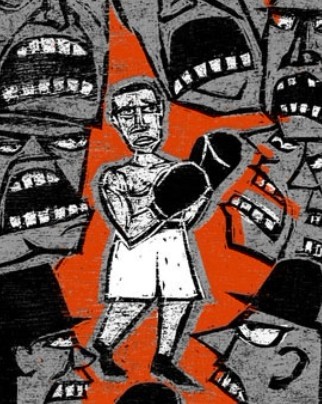(单词翻译:单击)
Books and Arts; Book Review;Racism in sport;
文艺;书评;运动场上的种族歧视;
The black white hope;
黑白的希望;
The Longest Fight: In the Ring with Joe Gans, Boxing's First African-American Champion. By William Gildea.
《最漫长的比赛:与首位美裔黑人拳击冠军——乔甘斯同行》威廉姆吉尔迪亚著。
“THE whitest black man that ever entered the ring,” said a famous American sports writer a century ago in praise of Joe Gans. Given the place and the time, the comment was unexceptional. It is Gans's reaction to the insulting words that still astounds. Far from being offended, the first American-born black boxer to win a world title regarded it instead as a compliment. So, less remarkably, did his numerous white fans.

一百年前,某位著名的美国体育记者曾这样赞赏乔甘斯:“他是拳击场里最受白人拥戴的黑人。”彼时彼地,这绝不是一条普普通通的评价。甘斯对别人的侮辱有着惊人的忍耐力。对于首位赢得世界第一的美国本土黑人拳击手来说,这样的评价绝不是冒犯,而是褒扬。就连他不计其数的白人粉丝听后也感到甘之如饴。
Against enormous odds, as William Gildea recalls in his episodic biography, Gans had by 1906 achieved the seemingly impossible. He actually left the ring a popular winner in successfully defending his title against Battling Nelson, a Danish-American, in Goldfield, Nevada. Even grizzled prospectors whooped when, after two hours and 48 minutes, the longest championship fight of the 20th century, Nelson was disqualified for a deliberate low blow.
威廉吉尔迪亚在传记里回忆到,虽然困难重重,但是甘斯在1906年做到了似乎不可能做到的事情。他挫败了来自内华达州金矿市的美裔丹麦选手贝特林纳尔逊,成功地捍卫了自己世界第一的称号,以最受拥戴的胜者姿态告别了拳击场。这场耗时两小时四十八分钟的比赛是20世纪最漫长的拳击赛,当纳尔森因蓄意打在甘斯的腰下部位而被判出局时,就连头发花白的老矿工也大声呐喊起来。
Extraordinary stoicism earned Gans his lasting popularity in America. Born and brought up in Maryland, a state bordering on the old Confederacy, he had to put up with the everyday humiliations suffered by all African-Americans there. And, on top of these, he had also to tolerate the particular horrors suffered by America's black sportsmen.
超凡的忍耐力为甘斯赢得了美国人民经久不衰的爱戴。乔甘斯生在马里兰,长在马里兰,这个州紧挨着老联盟,他每天都要忍受当地所有美裔黑人都会遭受的羞辱。除此之外,他还要忍受美国黑人运动员都会遭受的恐吓。
Gans, a naturally polite and cheerful man, was tutored always to show restraint by Bob Fitzsimmons, a world champion at three weights, who argued that you should do as you would be done by. In consequence, Gans learnt to remain impassive in the face of the most egregious provocations: even, for instance, when one opponent called him “133 pounds of black meat” and when another spat in his face as they squared up in the centre of the ring.
乔甘斯天性谦和开朗,世界冠军鲍勃费茨西蒙斯教会了他忍耐,因为鲍勃主张“己所不欲,勿施于人”。后来,甘斯学会了对于种种恶意挑衅漠然视之,就算有对手戏谑他是“133磅的黑肥肉”,就算在拳击场角斗时对手向他脸上啐唾沫,他也绝不动怒。
Like other black boxers, Gans was exploited by the low-life types that inhabited professional boxing. Promoters paid him less than his white rivals, even when he was the main draw. His sleazy manager, Al Herford, bet heavily against Gans in two fights and then ordered him to lose. Gans eventually sacked his manager, confessed to the fixed fights, won international recognition as a fine champion and was mourned by thousands, white and black, at his funeral in Baltimore, when he died from tuberculosis at the then typically early age of 35.
和其他黑人拳击手一样,甘斯也要遭到职业拳击行业里手段卑鄙的剥削。虽然双方打平,赞助商付给甘斯的酬劳却比付给他白人对手的要少。他下作的经纪人阿尔赫福德下了大注赌乔甘斯输,于是他便命令乔甘斯必须输。甘斯最后解雇了他的经纪人,并向公众坦承自己操纵了比赛,甘斯因此赢得了全世界的肯定,成了人们心目中最受尊敬的冠军。但是甘斯却在35岁是因罹患肺结核而英年早逝,在他巴尔迪摩的丧礼上,成千上万的粉丝,无论白人黑人全部为其默哀。
Mr Gildea, a talented sports journalist with a ready following among American readers, is nostalgic for the days when crowds of 125,000 jammed into wooden stadiums to watch prizefights although not, of course, for the racism that then infected this and other sports. He is also nostalgic for the days when Goldfield was a rip-roaring, hard-drinking, sinful boom town. Those times, too, have gone. On a day trip to Goldfield, he saw several empty shops and houses, only four other people and a petrol station with a sign reading: “OPEN EXCEPT WHEN CLOSED”. This is a memorable book about a time that should not be forgotten.
才华横溢的体育记者吉尔迪亚将和众多拭目以待的美国读者一起缅怀那段熙熙攘攘的125000人涌进木质体育场里观看职业拳击赛的光辉岁月,当然他们的缅怀的绝不包括当时影响了拳击和其他体育比赛的种族歧视。吉尔迪亚怀念的还有当年热闹喧嚣,酒鬼遍地,罪恶却繁荣的金矿市。那些日早已一去不返。吉尔迪亚花了一天时间故地重游,商铺和住宅已经人去楼空,只看见聊聊四人和一个加油站,上面写着:“关门大吉”。这是一本关于一段值得铭记的岁月的回忆录。


